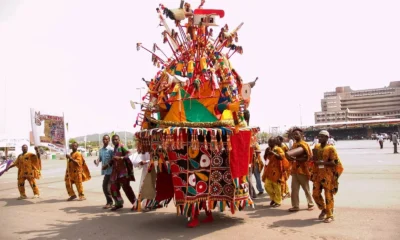Cultural tourism
Umueri: The Hidden River Gem of Anambra || Tourism, Landmarks and Cultural Wonders
Discover Umueri, a riverine town in Anambra State with rich culture, riverside scenery, vibrant festivals and the Chinua Achebe International Airport. Learn what to see, where to go, and how Umueri is building a new tourism future.

Chinua Achebe International Airport, Umueri
Tucked along the banks of Anambra River in the northeastern part of Anambra State situates Umueri, a town whose beauty, history and cultural vitality reflect the heart of the Omambala region. Umueri, sometimes spelled Umuleri is one of the oldest and most significant communities in Anambra East Local Government Area.
The town is widely recognized for its deep-rooted traditions, fertile riverine landscape and the vibrant spirit of its people. With a history tied to the early settlements of the Igbo people along the Anambra River, Umueri holds both cultural and ecological importance in southeastern Nigeria.
Over the years, the town has grown from a quiet agrarian community into a fast-developing town with increasing attention from tourists, investors and government agencies. The establishment of the Chinua Achebe International Airport on its land has placed the town firmly on the map, opening it up to new opportunities in trade, travel and tourism.
Yet, despite the gradual urbanization, Umueri retains the calm rhythm of a river town, surrounded by lush vegetation, flowing streams and the gentle hum of traditional life.
Beyond its geographical beauty, the town is rich in festivals, folklore and artistic expression. From the Omambala Cultural Festival to the annual New Yam celebration, the town’s cultural calendar draws indigenes and visitors together in displays of unity, dance and reverence for heritage.
The people are deeply spiritual, with a worldview that blends traditional beliefs and modern Christianity. Markets thrive with local produce, palm wine and river fish while artisans continue to craft items that tell the story of their ancestry.
Today, Umueri is emerging as a promising tourism destination, not just for its airport or historical past, but for its potential to offer visitors an authentic experience of Igbo riverine life. With its natural landscapes, cultural wealth and growing infrastructure, Umueri stands at the intersection of tradition and transformation, ready to welcome the world to its shores.
Getting There and Getting Around Umueri
Umueri is located in Anambra East Local Government Area of Anambra State, southeastern Nigeria. It lies about 30 kilometers from Onitsha, the State’s commercial capital, and roughly 45 kilometers from Awka, the State capital. The town is easily accessible by road, with well-connected routes from nearby communities such as Aguleri, Nsugbe, Anam and Otuocha. From Onitsha, travellers can reach Umueri through the Otuocha–Nsugbe road while those coming from Awka often pass through Adani or Nteje.
A major boost to Umueri’s accessibility is the presence of the Chinua Achebe International Airport located within the town. Commissioned for operations in 2021, the airport serves as one of the key aviation gateways in southeastern Nigeria. It not only connects Umueri to major cities such as Lagos, Abuja and Port Harcourt but also positions the community as a strategic point for tourism and commerce in the region.
Within Umueri, transportation is fairly straightforward. Commercial motorcycles (okada) and tricycles (keke) are the most common means of movement for residents and visitors alike. They connect the different villages and nearby towns, making short-distance travel convenient and affordable.
For longer distances, minibuses and private vehicles operate regular services to Onitsha, Awka and Enugu. The riverine setting also supports local canoe and boat transport, especially for those living close to the Anambra River and surrounding fishing settlements.
Whether arriving by air, road or river, visitors find Umueri easy to reach and explore. Its growing transport network, supported by natural waterways and modern infrastructure continues to enhance its appeal as a comfortable and scenic destination in Anambra State.
The Riverside Experience of Umueri

Omambala river
Life in Umueri is deeply intertwined with the Anambra River locally known as Omambala. The river defines not only the town’s geography but also its rhythm and identity. Flowing gently through the community, the river offers an ever-changing view of sparkling waters, fishing boats and lush vegetation along its banks.
For visitors, the riverside presents one of the most peaceful and naturally beautiful parts of southeastern Nigeria, making it a perfect retreat for anyone seeking calm, reflection or connection with nature.
The banks of Omambala River are lined with tall palms, bamboo clusters and occasional farmlands where locals grow vegetables, yam and cassava. Early mornings bring a misty calm that slowly gives way to soft sunlight dancing on the water’s surface – a scene that photographers and nature lovers find irresistible. In the evenings, the riverside becomes a quiet haven where residents gather to unwind, children play nearby and fishermen return with their catch for the day.
For tourists, the area offers excellent opportunities for photography, picnics and nature walks. The scenic expanse of the river and surrounding landscape creates a natural backdrop ideal for cultural documentaries and eco-tourism. Birdwatchers can often spot various species native to the region while the occasional ripple of canoes adds movement and authenticity to the experience.
Beyond its visual appeal, Omambala River remains central to Umueri’s way of life. It provides fish for local cuisine, supports traditional rituals and serves as a symbol of peace and continuity for the people.
Spending time by the riverside allows visitors to experience Umueri’s “slow-time” pleasures – moments that blend silence, beauty and the gentle rhythm of river life that has shaped generations of its people.
Heritage and History You Can Feel in Umueri

Ijele Masquerade
Umueri history runs deep, woven into every path, shrine and homestead that dots its landscape. The town is one of the oldest settlements in the Anambra River basin sharing ancestral ties with neighbouring Aguleri and other Omambala communities.
Oral traditions trace Umueri origins to the ancient migrations of the Igbo people who settled along the river drawn by its fertile lands and abundant water. Over the centuries, these early settlers developed strong agricultural, spiritual and trade systems that shaped the identity of the community.
Walking through Umueri today feels like stepping into a living museum of Igbo heritage. The town’s layout, traditional compounds and sacred groves still reflect the customs of old. Elders recall stories of early alliances and territorial boundaries as well as the cultural bonds that have sustained peace and cooperation with neighbouring towns. The Omambala River revered as both a life source and a spiritual symbol remains central to the town’s collective memory and identity.
Some family lineages still preserve relics, ancient tools and ceremonial artifacts handed down from their ancestors. These objects, often displayed during festivals or family gatherings serve as reminders of the resilience and creativity of Umueri people.
The presence of ancestral shrines and historical landmarks around the community connects the past to the present, reminding visitors that Umueri story is not just written in books but lived daily through its people and their traditions.
For visitors, this sense of living history is what makes Umueri truly special. The town offers not just sights to see but experiences to feel. From the echoes of ancestral songs to the quiet dignity of elders who guard centuries of wisdom. Umueri stands as a testament to heritage that endures, inviting every guest to touch, hear and understand the history that continues to shape the soul of the community.
The Chinua Achebe International Airport in Umueri

Chinua Achebe International Airport
One of the most defining landmarks in Umueri today is the Chinua Achebe International Airport, a modern facility that has transformed the town into a major entry point to Anambra State and the wider southeastern region. Officially commissioned for operations in 2021, the airport is situated on Umueri land, making the community a strategic hub for air travel, trade and tourism.
The airport, named after the world-renowned novelist Chinua Achebe stands as a symbol of progress and pride for both Umueri and Anambra State. Its construction reflects the State government’s vision to boost economic growth, create jobs and open up rural communities to national and international opportunities. The facility features a long runway capable of accommodating large aircraft, a modern terminal building and essential safety infrastructure that meets global aviation standards.
For travellers, the airport offers a convenient route to Umueri and neighbouring towns such as Aguleri, Nsugbe and Otuocha. It has significantly reduced travel time between Anambra and major Nigerian cities like Lagos, Abuja and Port Harcourt while also supporting cargo operations that benefit local farmers and traders. The influx of visitors, investors and business activities has begun to stimulate hospitality services, transportation and small-scale enterprises across the area.
Beyond its economic value, the Chinua Achebe International Airport has become an attraction in its own right. Visitors often stop to admire its architecture and take photographs at the beautifully designed entrance which proudly bears the name of one of Africa’s greatest literary figures. The presence of the airport gives Umueri a modern identity without erasing its traditional roots, symbolizing a bridge between heritage and development.
As the airport continues to expand its capacity and routes, it holds immense promise for tourism in Umueri and the entire Omambala region. With improved accessibility and growing awareness of the town’s cultural and natural attractions, Umueri is steadily positioning itself as a destination where history meets modern progress.
Markets, Food and the Taste of Umueri
The marketplaces of Umueri are more than centres of trade. They are vibrant social spaces where the community’s rhythm comes alive. From early morning until dusk, traders, farmers and visitors gather in lively exchanges that blend commerce with camaraderie.
The town’s main markets, including Eke Umueri, Nkwo Umueri and smaller village markets, serve as vital economic and cultural hubs. They provide everything from fresh farm produce and fish from the Anambra River to handcrafted household items, fabrics and traditional medicines.
At Eke Umueri, one of the busiest market days, the scene is a colourful mix of traders displaying baskets of vegetables, tubers of yam smoked fish, palm oil and spices. Women in wrappers and headscarves negotiate prices cheerfully while the air carries the aroma of freshly fried akara and roasted plantain. The market also acts as a meeting point for neighbouring communities such as Aguleri, Nsugbe and Nando, making it a small but thriving centreof local commerce.
Food in Umueri reflects the town’s riverine and agricultural character. Fish remains a staple, often prepared fresh or smoked and served with yam, cocoyam or cassava. Popular local dishes include ofe onugbu, ofe akwu and nsala which are enjoyed with pounded yam or fufu. Residents also take pride in preparing ji akwukwo, a special yam dish wrapped in vegetables, and ukwa which is both a traditional delicacy and a symbol of hospitality.
Palm wine locally tapped from raffia palms holds a special place in social and ceremonial gatherings. It is often shared during festivals, family meetings and market days as a sign of friendship and goodwill. Small food joints and local bars around Umueri provide visitors with an authentic taste of these delicacies, often accompanied by lively conversations and traditional music in the background.
The food culture of Umueri is not just about sustenance, it is an expression of community and heritage. Each dish tells a story of the people’s connection to the river, the soil and their ancestors.
For tourists and returning indigenes, tasting the local cuisine is an essential part of experiencing the warmth and authenticity that define Umueri’s way of life.
Local crafts, small businesses and homestays
The economy of Umueri thrives on the creativity and hard work of its people. Though traditionally an agrarian community, the town has in recent years witnessed steady growth in small businesses and cottage industries. Many residents engage in farming, fishing, trading and craftsmanship with products that reflect both the town’s riverine environment and cultural heritage.
Local artisans produce a range of handmade goods that sustain family incomes and preserve indigenous skills. Craftsmen are known for their work in wood carving, basket weaving and pottery, often using locally sourced materials.
These crafts are not only functional but also artistic, serving as household items and cultural symbols during traditional ceremonies. Women, in particular, play a vital role in processing and selling agricultural products such as palm oil, garri, smoked fish and vegetables in local and regional markets.
Fishing remains a central occupation for many families, supported by the abundance of the Anambra River. Fishermen use canoes and traditional nets, supplying fresh fish to nearby towns and markets. Small-scale fish smoking and preservation businesses have also emerged, providing employment and enhancing local food trade.
In addition, young entrepreneurs are increasingly venturing into modern services such as barbing salons, tailoring, motorcycle repair and phone charging centres, contributing to the community’s evolving local economy.
With the recent boost in accessibility brought by the Chinua Achebe International Airport, Umueri is beginning to see more visitors and returning indigenes, creating opportunities for community-based hospitality.
A few residents now offer homestay accommodations. Modest but comfortable rooms where guests can experience local life firsthand. These arrangements allow visitors to participate in family meals, learn about traditional customs and enjoy the warmth for which Umueri people are known.
While large hotels are still few in number, nearby towns such as Aguleri and Otuocha provide additional lodging options. The gradual rise in small businesses and homestay initiatives suggests that Umueri tourism and local enterprise sectors are poised for healthy growth. The community’s commitment to hospitality, craftsmanship and entrepreneurship continues to shape its reputation as a welcoming and industrious town in Anambra State.
Landmarks and Photo-friendly Spots in Umueri
Umueri is blessed with a blend of natural beauty and emerging infrastructure that makes it one of the most visually appealing towns in Anambra State. The town’s landscape combines the calm of its riverine environment with the charm of traditional compounds and modern developments, offering visitors a variety of scenic and culturally rich locations to explore and photograph.
One of the most prominent landmarks is the Chinua Achebe International Airport which stands out as a symbol of progress and pride for the people of Umueri. Its expansive runway, modern architecture and beautifully landscaped surroundings make it a favourite spot for photography, especially among travellers and returning indigenes. The airport area provides sweeping views of the countryside, particularly during sunrise and sunset when the golden light reflects over the Omambala plains.
The Anambra River (Omambala River) remains the town’s most captivating natural feature. Its wide, flowing waters lined with palm trees and fishing boats, create a picturesque setting that attracts both locals and visitors. Early mornings at the riverside are ideal for photography, capturing fishermen setting out in their canoes or the quiet mist that rises from the water’s surface. The riverbanks also serve as serene picnic spots and relaxation areas for those seeking nature’s calm.
Traditional landmarks such as the Umueri Palace, ancestral shrines and historic village squares offer a glimpse into the town’s deep-rooted heritage. Their traditional architecture and open courtyards provide authentic backdrops for cultural photography and storytelling. During festivals and masquerade performances, these places come alive with vibrant colours, traditional attire and rhythmic drumming – moments that capture the true essence of Umueri spirit.
Visitors interested in panoramic views can explore the rolling farmlands and green belts surrounding the town. These areas are perfect for countryside photography, especially during the planting and harvest seasons when the fields display rich shades of green and gold. Local markets, particularly Eke Umueri and Nkwo Umueri also present lively photo opportunities, showcasing daily life, trade and community interaction.
Every corner of Umueri tells a visual story of water, culture and resilience. Whether it’s the calm reflections of the river, the energy of the market, or the pride of modern infrastructure, the town offers endless opportunities for visitors to capture its enduring beauty and cultural depth.
Responsible Tourism: Respecting Culture and Supporting the Community
Visiting Umueri offers travellers a chance to experience authentic Igbo riverine life. But it also comes with a responsibility to respect the people, their culture and their environment. The town values hospitality and friendliness. Yet, visitors are encouraged to approach their stay with mindfulness and cultural sensitivity. Responsible tourism in Umueri is about ensuring that the benefits of travel go hand in hand with preserving the community’s traditions and natural surroundings.
Visitors are advised to dress modestly, especially when attending cultural events, visiting local markets, or entering sacred areas such as shrines or ancestral compounds. It is respectful to greet elders first and use polite salutations when engaging with locals. Photography is generally welcome, but visitors should always ask for permission before taking close-up photos of individuals, ceremonies or sacred sites.
The people of Umueri take pride in their environment, and the community continues to promote clean surroundings through regular communal work days known as “igba ogbo.” Tourists are encouraged to avoid littering, minimize plastic use and properly dispose of waste, especially along the riverbanks. Participating in or supporting these local efforts shows solidarity with the community’s goal of keeping Umueri clean and green.
When purchasing souvenirs, crafts or food items, buying directly from local traders and artisans helps sustain small businesses and keeps income within the community. Those staying in homestays can also support local families by sharing skills, joining in communal activities or contributing to local projects where appropriate. Respect for local customs and genuine interaction with residents enrich the travel experience for both visitors and hosts.
Umueri’s growing appeal as a tourism destination depends on maintaining a balance between development and tradition. By practicing cultural respect, environmental care and community support, visitors play an important role in protecting the town’s heritage while enjoying its charm. Responsible tourism ensures that Umueri remains not only a place to visit but also a place that thrives for generations to come.
Challenges Facing Umueri’s Tourism Development
While Umueri holds enormous potential as a tourism destination, several challenges continue to slow the pace of growth. These issues range from infrastructural gaps to environmental and administrative concerns that need careful planning and community cooperation to overcome.
One of the most significant challenges is infrastructure. Although the Chinua Achebe International Airport has greatly improved accessibility, internal road networks leading to riverside communities and cultural sites remain underdeveloped. Many rural paths become difficult to navigate during the rainy season, limiting visitor access to some of Umueri’s most scenic and historic areas. Improved road construction and maintenance would greatly enhance mobility for both residents and tourists.
Another key concern is environmental management. Anambra River, while central to the town’s beauty and economy faces occasional pollution from waste disposal and agricultural runoff. Sustaining Umueri’s natural environment requires stronger community awareness and government support for waste control, riverbank protection and eco-friendly tourism practices.
Accommodation and visitor facilities also remain limited. While homestays and nearby lodgings provide basic comfort, the absence of larger hotels, tour services and structured visitor information points affects the overall tourism experience. Investment in eco-lodges, small resorts and hospitality training would create jobs and encourage longer visitor stays.
Additionally, promotion and coordination of tourism activities need improvement. Umueri’s cultural and natural assets are still relatively unknown outside Anambra State. The absence of organized tour packages, promotional materials and partnerships with travel agencies limits visibility. Stronger collaboration between the local government, traditional leaders and tourism boards could help market Umueri’s unique attractions to a broader audience.
Lastly, security and land disputes in some parts of the Omambala region have, at times, affected development initiatives. Although the community remains peaceful and welcoming, consistent dialogue and community policing are essential to maintaining safety and investor confidence.
Despite these challenges, the people of Umueri remain optimistic. With focused investment, environmental care and coordinated planning, the town can build a sustainable tourism model that benefits residents while preserving its natural and cultural heritage.
The progress made so far, especially in infrastructure and community organization shows that Umueri is steadily moving toward realizing its full tourism potential.
Tourism as a Catalyst for Community Growth and Investment Opportunities
Tourism presents a promising path for Umueri’s long-term economic and social development. Beyond attracting visitors, a well-organized tourism strategy can create jobs, stimulate local entrepreneurship and strengthen cultural pride among residents. The benefits of tourism, when managed sustainably, reach deep into the fabric of community life.
One of the most immediate gains lies in employment and income generation. From tour guides and boat operators to food vendors, artisans and transport providers, tourism creates multiple streams of livelihood. Young people can be trained as local guides or digital promoters of Umueri’s attractions while women’s cooperatives can supply crafts, traditional meals and souvenirs to visitors.
Tourism can also support cultural preservation. Festivals such as Ovie and New Yam, traditional music and masquerade performances can become regular cultural showcases providing both entertainment and education for visitors. With proper documentation and event organization, these cultural assets can be turned into annual attractions that celebrate Umueri heritage while bringing economic value to performers and organizers.
Investment opportunities in Umueri tourism sector are equally broad. The riverside area offers potential for eco-resorts, picnic spots and boat tours while the airport corridor can attract guesthouses, local restaurants and souvenir centres. Entrepreneurs can invest in guided tour services, heritage trails or cultural documentation projects that appeal to domestic and international travellers alike.
Furthermore, community-based tourism where residents actively manage and benefit from tourism activities can ensure that profits remain local. This model fosters a sense of ownership and encourages responsible tourism that respects local traditions and the environment. Initiatives like homestays, guided cultural walks and farm-to-table dining experiences can give visitors authentic encounters while empowering local households.
Finally, the growth of tourism can improve public infrastructure. Increased visitor traffic often encourages better road networks, waste management, healthcare access and security. With coordinated planning and transparent use of tourism revenues, these improvements can raise the overall quality of life in Umueri.
If properly harnessed, tourism can become a major driver of inclusive development that connects Umueri’s past, present, and future through shared prosperity, cultural pride and environmental care.
Closing Thoughts…
Umueri stands today as one of Anambra’s most promising riverine destinations. A town where natural beauty, living history and cultural pride flow together like the gentle waters of the Omambala River. From its scenic riverside and vibrant markets to its festivals, crafts and welcoming people, Umueri offers visitors a rare glimpse of authentic Igbo life that is both traditional and forward-looking.
While the road to developing a full-fledged tourism industry may have its challenges, the town’s strong communal spirit, strategic location with the Chinua Achebe International Airport and growing awareness of its cultural assets position it well for sustainable growth. Each visit, each photograph taken by the river and each handshake with a local trader or artisan adds to a story that is still being written. A story of a town rediscovering its strength through tourism and heritage.
For travellers, Umueri offers more than sights to see. It offers a chance to connect to a people, a culture and a landscape that still beats with the rhythms of authenticity. For investors and planners, it presents fertile ground for eco-tourism, cultural ventures and small-scale hospitality projects that can create lasting impact.
Ultimately, the future of tourism in Umueri depends on a shared vision. One visitors respect, residents benefit from and nature is preserved. With the right partnerships and responsible engagement, Umueri can become not just a destination on the map but a living example of how culture and community can thrive together in the heart of Anambra.
References
- https://en.wikipedia.org/wiki/Umuleri
- https://tc.maptons.com/2886250
- https://www.youtube.com/watch?v=SOR-ObJTnIo&
- https://ejatlas.org/print/anambra-cargo-airport
- https://guardian.ng/business-services/twist-in-regional-competition-as-new-airport-opens-in-anambra/
- https://en.wikipedia.org/wiki/Anambra_International_Cargo_Airport
- https://www.thisdaylive.com/2022/04/11/metchie-invites-soludo-onyema-others-to-invest-in-umueri/
- https://en.wikipedia.org/wiki/Anambra_River
- https://www.vanguardngr.com/2025/09/anambra-govt-to-construct-second-airport-industrial-park/
- https://punchng.com/airline-anambra-community-clash-over-n100m-land/
- https://apexnewsexclusive.com/umueri-to-host-grand-2025-new-yam-festival-igwe-oke-ebo-ii/
- https://www.researchgate.net/publication/355040816_IMPACT_OF_DEVELOPMENTAL_ACTIVITIES_ON_ARCHAEOLOGICAL_AND_CULTURAL_RESOURCES_IN_AGULERI_AND_UMUERI_ANAMBRA-STATE
- https://nnewicity.com/umueri-town-anambra-history-airport-festivals-community-life/


























